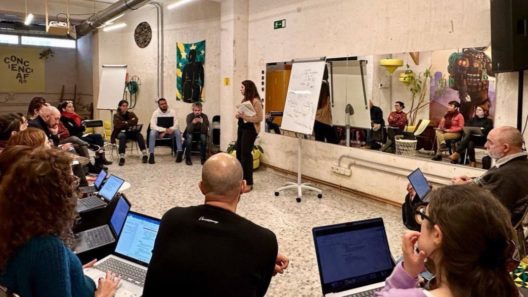Community-informed governance: reflections for the AI sector
What can we learn from Chile’s street-led deliberations and the demand for constitutional reform?
10 July 2024
Reading time: 11 minutes

Engaging the public will be an important part of solving the challenge of governing AI. But genuine public engagement demands certain conditions. For AI governance across the world, this means building legitimacy among those most affected by AI technology – from the communities that are now hyper-surveilled to those who are assassinated because an algorithmic targeting system has identified them as a target.
Opening up AI governance to the most affected communities and building legitimacy will require transforming institutions from the ground up. As Yasnaya Aguilar Gil[1] and Paola Ricaurte[2] say, we need to re-start from a practice of community care, ‘dismantling hegemonic narratives, identifying the root causes of problems, and from there constructing ways to eradicate them.’
Reflections for AI regulation: Linking mass mobilisation to systemic transformation
But how do local practices transform larger institutions? And what challenges will these transformations face? A wider trend, linking systemic transformations to deliberative processes and mass mobilisation in Latin America and the Caribbean, might provide necessary reflections for the AI sector, as institutions attempt to regulate and govern this technology.
Take, for instance, the Chilean case. In 2019, a social uprising in the country’s capital quickly turned into a nation-wide popular constitutional movement. People organised in informal deliberative assemblies and pushed for structural change, reimagining the foundations of their political institutions.
Attempting and failing to pass the constitutional reform in Chile points us towards two key questions: why is it crucial to anchor the use and regulation of disruptive global forces such as AI technologies to the foundational problems that communities face at the local level? And how can institutions better reflect the radical transformations demanded through protests and collective action, and connect them to existing decision-making processes?
Calls to reform the Chilean constitution
The 2019 Chilean uprising began as a student-led protest against the rise of subway fares and led to one of the most prominent instances of collective action in Latin America in recent years, engaging communities from the Atacama Desert to the Patagonian ice field.
Alongside taking to the streets in mounting protests against widespread inequality, people also organised in small, bottom-up assemblies (cabildos[3]). Groups of everyday people mobilised in these cabildos came out of their deliberations demanding deep institutional and political transformation, and focusing primarily on wage disparities and access to quality social services like education and healthcare.
These spaces brought together small groups, were convened by lay citizens, and gathered in public squares, streets and classrooms in a highly decentralised fashion. Communities met face-to-face to debate issues such as corruption, education, pensions and healthcare. According to early studies, in just the first two weeks of the protests, more than 15,000 people participated in the Chilean cabildos. Over 1,200 assemblies were registered between October 2019 and March 2020 across the country.
This mode of discourse challenged how public matters had traditionally been deliberated in Chile over the previous decades: inward facing debates with narrow ideological boundaries within the two main and long-standing parliamentary coalitions. The centre of gravity of these exchanges lay between the Parliament and the Executive, making the conversation exclusive and centralised.
In response to this lack of engagement in political conversations around inequality, and after 30 years of market-oriented and exclusionary neoliberal politics, protesters and communities from all over the country eventually pushed not simply for the reform of single laws or institutions, but for reforming the 1980 Pinochet-led constitution itself.
The drive of the protests thus created momentum for one of the most extraordinary constituent processes and one of the most progressive constitutional proposals in history.
The Constitutional Convention and the first new draft constitution
Giving way to the demands of the popular movement, in November 2019, the Chilean Congress reached a cross-party agreement to write a new constitution through the direct election of a Constitutional Convention. The arrangement, however, was initially disputed by the Chilean public as ‘much of Congress [and] the parties that were part of it lacked citizen trust and support’.
Eventually, however, Chileans ratified the institution of the Constitutional Convention in a vote that won with an overwhelming majority (78%). Notably, the agreement was supported also by voters of coalition parties that had previously defended the continuity of Pinochet’s political heritage. A Constitutional Convention was appointed that included highly innovative elements, integrating gender parity, indigenous peoples’ representation, independent candidacies and civil society participation.
However, in the following months, the Convention confronted severe problems, including inner fragmentation, the gradual loss of the legitimacy it had managed to gain, the spread of fake news, misinformation and the militarisation of indigenous territories. The draft constitution it produced was rejected nationwide in the 2022 confirmation referendum.
Failure to harness the spirit of the cabildos
Despite the institutional openness and institutional infrastructure put in place to respond to the demands emerging from the mass deliberations, the Constitutional Convention ultimately failed to channel the spirit of protestors and of the cabildos.
Pamela Figueroa Rubio[4] describes the process as ‘the failed case of a perfect design’. She explains how the deliberative and relatively inclusive process, following the 2019 protests, was still not enough to create consensus over a new bill of rights.[5] People continued to be frustrated with both political institutions and structural inequalities.
In a second attempt to draft a new constitution, the Government took a different approach and established a constituent body led by experts. This operated within a highly institutionalised context, in which conservative parties held the majority. By the end of 2023, in a third referendum, Chileans rejected also the new draft proposed by this body, signalling that the political ideology divide was the core issue at hand.
The rejection of these proposals cannot simply be attributed to a failure of process design, as the constituent bodies represented two very different models of constitutional reform: an ad-hoc constitutional assembly in 2022 and an appointed expert commission in 2023. Nor did the rejection signal the need for more regulated designs for institutional processes, such as the sortition-based citizens’ assemblies that are becoming popular in Western contexts.
Instead, the story of the Chilean constitutional reform movement points to a context of deep distrust, inconsistency and inequality within institutional politics. The first Constitutional Convention faced severe challenges with legitimacy. Despite efforts to make it representative of the public, the public did not see their demands reflected in its proposal. The expert commission, in turn, lacked legitimacy due to people’s mistrust in the commissioning institutions and the lack of attention to structural concerns and how they developed in public debate, including the privatisation of health, social security and education in Chile.
A constituent moment
The epistemic change in Chilean society – a substantial shift in widely shared views on how a political society and its institutions should be organised, what goals they should pursue, and with what means – has yet to be echoed in a new constitution. However, the political horizons opened by the protest and mass deliberations created a constituent moment that is usually hard to achieve and will prove fundamental in governing in the future.
In the words of Claudia Heiss[6], there was ‘a break between social norms and overly rigid institutions inherited from the dictatorship.’ Protests re-politicised entire segments of the population, mobilising for rights denied or not achieved through the political processes of independence and democratisation. They channelled the search for legitimate forms of collective governance beyond outdated state institutions and enabled substantial shifts in public discourse.
What can we learn from this experience to inform how we approach public deliberation on foundational AI issues?
Public deliberation and deeply rooted responses to governance challenges
AI – and in particular generative AI – has quickly evidenced its capacity to change societies across the world, from data-driven initiatives that transform the healthcare system, to warfare and military intelligence.
In the absence of adequate regulation, prototypes for AI governance have been tested, drawing on structured forms of public engagement. In particular, public engagement has been gaining traction among both Western scholars and activists, and private companies such as Meta and OpenAI. These actors have been using multi-stakeholder, sortition-based dialogue, such as citizens’ assemblies, to advance some conversations around when and how to regulate AI and its uses. In these set-ups, group of randomly selected people participate in foundational debates about regulation, such as setting the boundaries for AI development and deployment to make the technology legitimate, fair and safe. If AI affects people everywhere, the argument goes, those same people should have a say in the matter.
While current strategies for citizen consultation may offer alternatives and produce sound recommendations on AI regulation, they leave key questions largely unresolved: how should the communities already affected by AI be involved? Who implements these assemblies, with what resources and constraints, and why? What are the implications of bringing together individual members of highly unequal societies to deliberate and recommend policies, often in the context of private, profit-led corporations? How do these assemblies interact both with national and supranational governments, and with social movements and other groups already mobilising on the question of AI regulation?
First, build legitimacy
The Chilean uprising and the constituent moment that followed it show us the need for building legitimacy first, by finding an anchor in pre-existing, deeply rooted spaces of collective care and collective action.
During the 2019 protests, for instance, Camila Vergara[7] put forward the ambitious proposal to anchor the Constituent Assembly in the bottom-up processes initiated with the cabildos, arguing that the grassroots assemblies that sprouted across Chile in 2019–2020 provided an inclusive and decentralised space for collective reflection and action. If implemented, this idea might have changed everything, as the Chilean cabildos implemented during the protests enabled citizens to challenge, delegitimise, politicise and question the institutional status quo – building communitarian networks, contesting the heritage of the military regime, and setting a new agenda for political change.
AI regulation: a bottom-up approach?
Similarly, ongoing AI regulation efforts may benefit from carefully considering how the public views, frames and considers systemic problems arising from or exacerbated by the use of AI. In the ongoing public discourse around AI regulation, alternative forms of bottom-up engagement of self-organised sectors and grassroot initiatives are still largely marginal. Engaging those sectors and entrenching their methods to shape governance initiatives from the start will be crucial to both meaningfully reflect public views and interests, and set the conditions for a just use of AI.
Looking at powerful bottom-up transformations reminds us that, while AI activists and participation scholars may turn towards prescribed deliberation, people-led movements over the last few decades have been taking a different direction. They have indicated the need for mass grassroots conversations and community-building as a pre-condition to the systemic transformations required to face AI-related challenges. This is especially true in contexts of deep inequality and institutional distrust, where community mobilisation historically offsets institutional power and establishes new normative trails.
Culture change
Open and mass deliberation connected to collective care is difficult to build. But as the world follows in the urgent need to regulate AI, it’s becoming necessary to radically change the discourse and culture around citizen engagement and regulation.
Among its many lessons, the Chilean uprising shows us that there are no quick fixes, and legitimacy and trust are built slowly – often after facing many setbacks. Anchoring AI discourses in well-established spaces of collective action shouldn’t simply be a means to legitimise its regulation. The social need for open and collective deliberation should instead signal, once again, the necessity to repay long-due social and historical debts – for example, by fostering spaces for communities to voice, exchange, and shape their demands.
The views expressed in this piece are of the author(s) and do not necessarily reflect those of the Ada Lovelace Institute.
Footnotes
[1] Yasnaya Aguilar Gil is a writer, linguist, translator, researcher and Ayuujk (Mixe) activist.
[2] Paola Ricaurte is an associate professor at the Department of Media and Digital Culture at Tecnológico de Monterrey in Mexico and a faculty associate at the Berkman Klein Center for Internet & Society at Harvard University in the US.
[3] Historically, cabildos have been spaces for deliberation and accountability between citizens and local authorities in Latin America. The institution dates back to the time of colonial rule, but the format — open, deliberative meetings around issues constitutive to polities — was appropriated by independence movements to trace the roadmaps toward breaking colonial ties and developing free, independent governments.
[4] Pamela Figueroa Rubio holds a PhD in American Political and Social Studies and is a Professor at the Universidad Santiago de Chile.
[5] Notably, a previous, multi-stage consultation process for a constitutional reform was introduced in 2015-2016 by then-President Michelle Bachelet, but it failed to secure support in Congress.
[6] Claudia Heiss is Head of Political Science at the Universidad de Chile.
[7] Camila Vergara is a critical legal theorist, historian and journalist from Chile.
Related content

Mobilising publics and grassroots organisations to impact AI policy
What can we learn from network-building initiatives in Spain?

Meaningful public participation and AI
Lessons and visions for the way forward